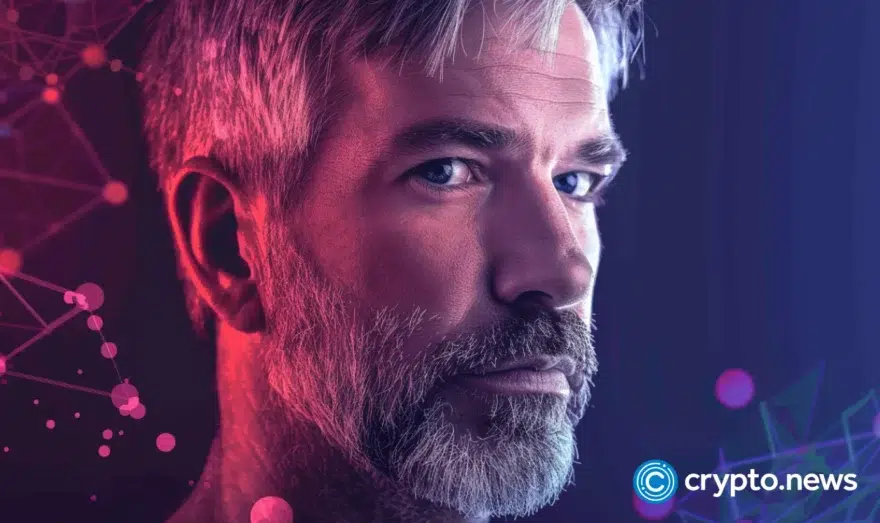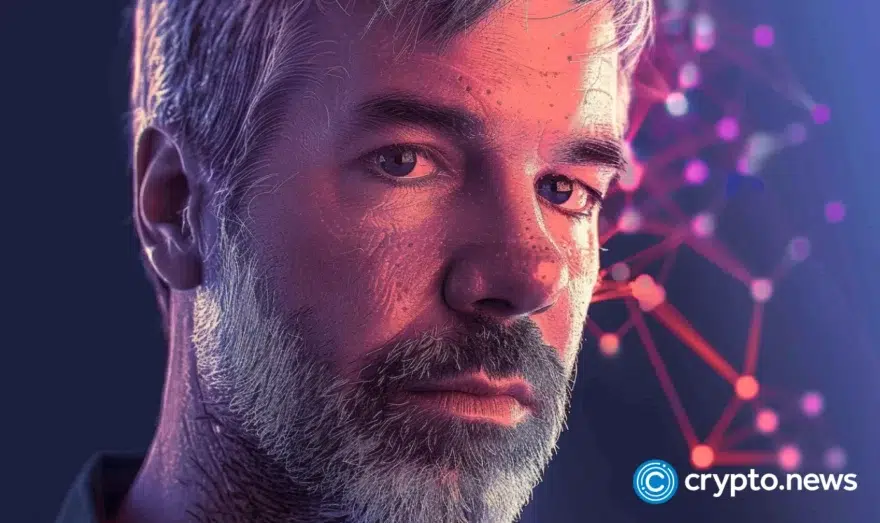Michael Saylor joins the debate over Bitcoin spam filter removal

- Michael Saylor stepped into the Bitcoin Core vs Bitcoin Knots battle, voicing remarks that cast a shadow on Bitcoin Core’s upcoming upgrade.
- The upgrade will remove the spam filter, allowing posting big-size images and other types of content on Bitcoin.
- Critics say arbitrary data will make it harder to use Bitcoin as electronic cash. Bitcoin Core v30 proponents say that Bitcoin is a permissionless data ledger, and the upgrade helps to realize its potential to the fullest.
On Sep. 16, 2025, the Strategy co-founder, Michael Saylor, said that “the good idea for Bitcoin will destroy Bitcoin.” He has been referring to the change in the Bitcoin Core protocol that goes live in October. It will remove a “spam filter” and let big portions of arbitrary data (images, texts, etc) be added to Bitcoin blocks.
Table of Contents
Does Saylor support the spam filter removal?
Saylor’s comments come when the debate over the need for the spam filter got extremely heated, dividing the Bitcoin community. Bitcoin Core supporters want Bitcoin to run all kinds of data, while the opponents warn that it will hinder monetary transactions due to spam.
Saylor gave a spacious comment on his stance about the Bitcoin Core protocol debate at Bitcoin Corporate Day. Here’s the shortened version of his speech on the topic:
“I think protocol proposals, however well-intentioned, can go horribly wrong. And I think that this debate we see right now over the OP_RETURN limit. The biggest danger is a very talented, well-funded, well-intentioned developer trying to do something good. The good ideas will destroy the company. The good idea for Bitcoin will destroy Bitcoin. If I wanted to destroy Bitcoin, I would just fund infinite developers who are very talented and tell them to make it better.
I would counsel extreme caution, extreme caution whenever it comes to “upgrading the protocol.” The lack of the feature is the feature. Maybe the world is the way it is because it should be that way.
I’m optimistic, though, given the way the community reacted. The community is going to have checks and balances, and there are going to be other implementations of Bitcoin that will form and that will keep us from going off the rails or doing something inadvertently that gets the network in trouble.”
Saylor did not explicitly mention Bitcoin Core v30, a version that deletes the spam filter. However, his skepticism towards well-intended devs who may destroy Bitcoin was seen mainly as criticism of the Bitcoin Core devs’ initiative.
Without calling names, Saylor suggested that certain cryptocurrency networks crashed and burned after adding too many features. Thus, it’s safe to say that Saylor signaled his conservative stance on the existing arbitrary data limit, siding with the Bitcoin Core opponents.
Saylor, whose company Strategy is the biggest corporate Bitcoin holder, usually speaks about Bitcoin’s impact on the U.S. or world economy. His comments on the spam filter debate are a notably rare instance of him talking about Bitcoin’s technical side.
Reaction to Saylor’s speech
Saylor’s speech didn’t go unnoticed among other bitcoiners who don’t want Bitcoin to include big-size images, NFTs, and other non-monetary data. The video clip of Saylor’s speech or posts with excerpts from it spread across Crypto X, pushing the debate forward.
While many opponents of the change in protocol praised Saylor’s remarks, critics reminded everyone that Strategy itself had a plan to launch a decentralized ID platform based on arbitrary data on Bitcoin. However, it didn’t take off.
Other criticism was aimed at the supporters of Bitcoin Knots, which is the main competitor of the Bitcoin Core protocol. The Knots client is not going to increase the arbitrary data limit, so more and more people are switching from Bitcoin Core to Knots. However, the Bitcoin Knots client itself has unique features, such as a stricter mempool and privacy policy. It can be viewed as an improvement; thus, it doesn’t align with Saylor’s call for the lack of features.
The debate continues
Bitcoin Core devs voted to remove the 83-byte limit for arbitrary data. On Jun. 9, 2025, Gloria Zhao, a Bitcoin Core maintainer, announced the removal of the spam filter in Bitcoin Core v30. The lengthy post contains no mention of the reason behind the change. Some reacted with words of support, while others were disgusted and claimed they would switch to Bitcoin Knots.
Those who don’t want to use Bitcoin Knots choose not to upgrade to Bitcoin Core v30. Some of these people include big names like Samson Mow, the JAN3 CEO, who claimed via X that he will not run a Bitcoin Core v30 node.
Knots’ share in the Bitcoin network grew to nearly 20%. In January 2024, there were only 69 Bitcoin Knots nodes. Now this number amounts to 4,200. It seems that the debate has fueled this client’s popularity.
Pete Rizzo, a crypto influencer known as The Bitcoin Historian on X, offered his explanation of why the Core vs Knots battle helps to promote Bitcoin Knots. In a recent episode of the What Bitcoin Did podcast, Rizzo suggested that the Knots narrative tempts “average user who isn’t Michael Saylor” to think they matter for Bitcoin. According to Rizzo, this is not the case because Bitcoin stopped being an inclusive network where everyone mattered somewhere around 2022.
Bitcoin Magazine journalist Frank Corva endorsed this explanation as the best. He went so far as to call the Knots node count “juked.” Some believe that people close to Bitcoin Magazine may have their own interest in pushing for the Bitcoin Core v30 upgrade and fighting against the critics.
Earlier, some speculated that the entire thing was probably sponsored by Citrea, a company focused on using Bitcoin for smart contracts and other use cases similar to Ethereum. According to CasaHODL co-founder and Citrea investor Jameson Lopp, Citrea doesn’t need the OP_RETURN limit removal to store data on Bitcoin; however, it could benefit from the larger limit.
Bitcoin Core v30 critics offered all kinds of reasons to keep the OP_RETURN limit as it is. Whereas Saylor is saying that changing the small parameters of Bitcoin may lead to major ones, like changing the total supply cap. The reasons cited by others include the following:
- Spam (non-monetary) transactions will make it harder to use Bitcoin as electronic cash
- Bitcoin may become a storage for illicit files, which may turn regulators against Bitcoin
What leaves an impression of a gaping hole is the lack of a clearly articulated reason for a sudden change in the anti-spam policy. For many, the spam filter removal looked like a sudden off-the-wall proposal. The way the Bitcoin Core devs ignored the critics and kept pushing the change was another strike. The recurring narrative backing the Bitcoin Core v30 implementation is that letting ordinals and arbitrary data is the full realization of Bitcoin’s potential and censorship resistance.
Such an approach ignores the very Bitcoin whitepaper, saying that Bitcoin is electronic cash. However, it really does align with Bitcoin’s potential capabilities. What’s not clear is why the implementation happens now and why the Bitcoin Core devs are so urgent and unflinching.
















